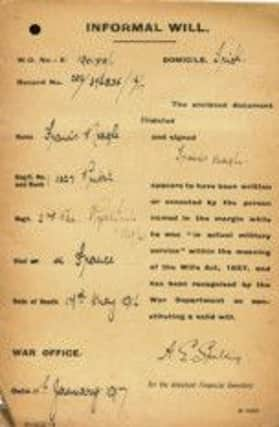Discover the wills of fallen soldiers at the National Archive


The online database at soldierswills.nationalarchive.ie gives people the opportunity to search for the will of their relatives who were killed in action.
The National Archives holds over 9,000 wills of enlisted and non-commissioned soldiers from the thirty-two counties of Ireland who fought in the British Army in the World War I and in the South African war of 1899-1902. The collection does not include wills of commissioned officers.
Advertisement
Hide AdAdvertisement
Hide AdThe Army provided several alternative ways of making a will, including forms in the Soldiers’ service book and separate pre-printed will forms. Soldiers were encouraged to make wills because, in the event of their death, it simplified the settling of their affairs, but it was not obligatory.
Each soldier was issued with a pocket service book (measuring 14cm x 9cm) called ‘The Small Book’. This book provided information for the soldier such as Army regulations, and a record of his training. It also included pages on which the soldier could make his will. These varied somewhat over the period of the war and some are pre-printed forms, but the most commonly used was a blank page entitled ‘Will’, which the soldier completed in his own words, but guided by printed instructions. The pre-printed forms recorded the name, rank, regiment and regimental number of the soldier, the name and address of the person to whom he wished to bequeath, and his relationship to this person, and the names of witnesses. Where the wills were not witnessed, as required by the Wills Act, 1837, they are known as ‘Informal Wills’ and most of the wills are in this category. A further declaration stating the legality of the will was made in the War Office, which in the early stages was attached on a separate page and later was made on the envelope entitled ‘Informal Will’.
Wills could also be made on separate forms provided by the Army and were signed by two witnesses, who could be fellow soldiers or officers. These were considered to be ‘Formal wills’. Some of the formal wills are stamped in the various Army record offices where they were held until recovered on the death of the soldier. Provision was also made for missing wills or ‘Nuncupative Wills’, where it was believed that the soldier had particular intentions but no written will could be found. The War Office had forms completed by the family or beneficiaries and then processed the will as normal. In a small number of cases, letters from soldiers to family or friends were accepted as their will.
Following the death of a soldier domiciled in Ireland, his will was sent to the War Office in London and then forwarded to the Probate Office in Dublin. The wills were transferred from the Probate Office to the National Archives. The Soldiers’ Wills were not entered in the probate calendars produced by the Probate Office each year, and this was also the practice in Scotland and in England and Wales.
Advertisement
Hide AdAdvertisement
Hide AdMost of the soldiers were very young and did not have wives or children, and in many cases the beneficiary was their mother or father, siblings or the friends serving with them. The Soldiers’ Wills are an important historical record of the men who served, their social and economic background and give valuable information on relatives and relationships.